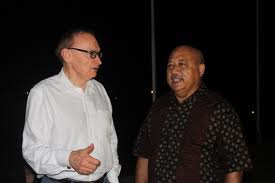
As argument rages over Japan bowing to Australian pressure to exclude Frank Bainimarama from the forthcoming PALM summit of Pacific leaders, we’re newly reminded of the striking disconnect between the attitude of the Labor Government and ordinary Australians towards Fiji. Pick up any newspaper and the tough rhetoric of its politicians in the news pages about Fiji’s “draconian” regime gives way to glowing articles in the travel pages extolling the country’s charms.

It’s worth reading the latest – this offering in the Fairfax Media listing “Twenty reasons to visit Fiji”. Why is it worth reading? Well for a start, most locals wouldn’t be able to give you 20 reasons off the top of their own heads so it’s worth reminding ourselves of the attractions all around us that are sometimes taken for granted. But it also explains why Australians keep coming in large numbers even as their government imposes sanctions on the country and Australian trade unions leaders urge them to stay away. Of the 631,000 visitor arrivals in 2010 – the latest figures available – more than half – 318,000 – were Australians. Why do they come? Well, cheaper air fares, a four hour daylight flight and the strong Aussie dollar are undoubtedly part of the answer. But the relationship goes far beyond that.
The recent floods threw up countless examples of the strong bonds forged between Australian visitors and the ordinary people they meet in Fiji. It wasn’t just the gratitude expressed by individual visitors in the media for the assistance they’d received, sometimes from people who’d lost everything in the disaster. Many people back in Australia who’d holidayed in Fiji dug deep to support the various flood appeals in ways that were sometimes deeply moving for the expatriate Fijians involved. One of the organisers of the Sydney appeal, Joweli Ravualala, tells of bursting into tears when an elderly Sydney woman gave him two weeks of her pension.

There are countless stories of friendships forged during Australian holidays to Fiji. Grubsheet made one of the mining ads currently screening on Australian television that features a man called Ken Lamb, a real life Crocodile Dundee who supplies heavy equipment to the mining industry in the South Australian outback. Every year, Ken and his wife, Val, like to get away from the dust and heat to unwind at a resort on Viti Levu’s Coral Coast. And over the years, they’ve formed close friendships with some of the resort workers and their families. A couple of years back, Ken took over a box full of those instant prescription glasses you can buy at any chemist in Australia to distribute to the surrounding villages. I’ll never forget the look of delight on his face as he told of the looks of delight on the faces of many of the elderly Fijians who’d benefited from this simple gesture. They were able to read again for the first time in years.

This is the real glue of the Fiji-Australian relationship, not some here-today-gone-tomorrow politician like the miserable Bob Carr, Australia’s nerdy and intellectually pretentious foreign minister. Like his super-arrogant, Napoleonic predecessor, Kevin Rudd, Carr displays a disturbing ignorance about the factors that brought about the 2006 coup in Fiji. It’s perhaps understandable that an Australian politician who owes his very existence to the trade union movement should be so obsessed with the fate of one or two Fijian union leaders who’ve fallen foul of the regime. Yet it beggars belief that while he acknowledges that Fiji is taking “credible steps” to return to democracy, Carr wants to maintain sanctions and keep up the pressure because Fiji “hasn’t done enough”.

Done enough of what, Mr Carr? For the first time in more than a decade, Fiji has a government committed to multiracialism and – for the first time ever – creating a level electoral playing field for all its citizens. It is providing basic services to areas of the country sorely neglected by previous administrations. It is fighting corruption and instituting a raft of measures to ensure proper standards of governance. It is maintaining its regional obligations – including leadership of the Melanesian Spearhead Group – and providing troops to the UN to maintain order in places like Iraq. It is formulating a new constitution to provide Fiji with real democracy – one person, one vote – for the very first time. Yet it “hasn’t done enough” because it hasn’t bowed to Australian demands for an immediate election that would alter nothing because none of the reforms the country so badly needs will have been instituted.
How ironic that a nation that prides itself on its own multiracial and multicultural success can have so strongly supported the previous Qarase Government, with its corruption and blatantly racist agenda to disadvantage 40 per cent of the population. How lamentable that the Australian Labor Government does everything it can to weaken the Bainimarama regime in its quest for racial equality and good governance in Fiji. How out of step is Labor on this with the sentiments of a great many ordinary Australians, just as it is on so many other issues. Fortunately for Fiji, all the opinion polls tell us they can’t wait to turf Labor out.
FURTHER READING : To follow is a devastating critique of Bob Carr’s “underwhelming” performance as foreign minister by academic commentator Peter van Onselen, writing in The Weekend Australia. “Is there a more obvious actor masquerading as a public intellectual in politics?”, van Onselen asks. Ouch.
RESERVE GRADER FUMBLES THE BIG LEAGUE
By Peter Van Onselen, Contributing Editor.
THE public reaction in the coming months to last week’s federal budget will determine whether or not Julia Gillard has a future beyond the winter recess of parliament. This week’s Newspoll registered a bounce in Labor’s support. But referring to a primary vote hitting 30 per cent as a “bounce” says more about Labor’s woes than signs of recovery.
Political redemption on the back of the budget and carbon tax compensation really are the Prime Minister’s last chances to build momentum. Previous false starts have been aplenty. A major one largely forgotten in the scandalous events of late was the arrival of Bob Carr in the Senate. We were assured that Carr would wipe out the spectre of Kevin Rudd as a wasted talent languishing on the back bench because of the former NSW premier’s consummate skills in the foreign affairs arena.
The reality has been somewhat different. His performance has been underwhelming. Carr told close friends that he would change the tone of the political debate when he arrived in Canberra, using his political skills to turn attention on to Tony Abbott’s failings. He was supremely confident. Instead, Carr has made blunder after blunder – both in terms of silly gaffes and more serious ministerial missteps.
The list is surprisingly long for someone who has been in the job for only a couple of months.
The most recent incident was Carr’s decision to openly discuss the details of a bilateral meeting he had with the Chinese leadership on his first trip to the emerging superpower. Rather than providing a broad outline of the discussions as is customary, Carr went into detail about what was discussed, what the Chinese said about Australia’s relationship with the US, and what it all meant for the global diplomatic environment. Rather than playing the role of Foreign Minister, Carr fell into the mould of a BA graduate playing professor, lecturing journalists on international affairs. It was inappropriate.
But no one who has traced Carr’s arrival in federal politics should be surprised. Early hopes that his talent would shine have been replaced by the realities of an old man stepping into a contest he isn’t equipped to handle.
Bill Kelty was right this week when he said the government had to stop blaming the Opposition Leader for its problems. Carr has simply compounded that mistake since his arrival.
The analogy of retired footballers making a comeback, but finding the pace of the game hard to handle, is often used in politics. In Carr’s case there is an added layer of inadequacy. As a former premier he is analogous to a captain of reserve grade. Long since retired, he has attempted to come back as a senior playmaker in first grade. Seen in such terms, the move was never likely to succeed.
Carr’s first error after being announced as the new Foreign Minister was over Papua New Guinea, when he used a television interview to suggest sanctions might need to be considered. It was offensive to our near neighbour and represented the sort of domestic political intervention foreign ministers should avoid. He backtracked soon enough.
Then there was the case of the Brazilian man who lost his life in a police taser incident. Carr told reporters he asked Brazilian diplomats to pass on his condolences to the man’s parents. Unfortunately for the poorly briefed Carr, the man was an orphan. This minor gaffe is just the sort of daily detail a professional across his brief should avoid.
Speaking of minor gaffes, the Foreign Minister’s maiden speech, wherein he waxed lyrical about history and philosophy, all the while referring to mainstream authors to highlight his worldliness, included reference to the “memorable” Sydney Olympics closing ceremony in, wait for it, “September 2001”.
A more serious error occurred earlier this year when Carr suggested that the Taliban didn’t need to be included in security discussions about Afghanistan. This came just before an international consensus on including the Taliban in such negotiations formed. Yesterday he told Sky News “Taliban involvement in the coalition would be desirable”.
The chopping and changing can be viewed in conjunction with Carr’s attempt, at a press conference, to switch journalists’ attention from a rogue US soldier who slaughtered innocent Afghan women and children to Abbott’s polling numbers that day. It was a case of Carr looking to move on to (not from) base political issues.
In another mistake since returning to politics, Carr has potentially increased the commonwealth’s liability in James Ashby’s lawsuit. The former staffer to Peter Slipper is suing over alleged sexual harassment, and Carr saw fit to tweet that “this Ashby seems more rehearsed than a kabuki actor”. Not content with that intervention, Carr echoed those sentiments (and more) when interviewed. The consequence: Ashby’s lawyers have added the potential damage done to his reputation by Carr and other politicians stupid enough to offer views on the veracity of his claims.
The irony of Carr’s comments about Ashby is that they would have been more appropriately attributed to himself. From scripted lines to the intellectual aura Carr seeks to exude, is there a more obvious actor masquerading as a public intellectual in politics?
Finally, we return to the budget – Gillard’s last hope to hang on to the leadership. It included walking away from pre-election commitments to increase the foreign aid budget. Here was a chance for Carr to show his true worth in his new portfolio – using his party elder status to avoid making the underdeveloped world fund Wayne Swan’s return to surplus. Instead he allowed the reduction in spending to go ahead, creating a sharp contrast to how Rudd would have approached the issue, one imagines.
Labor strategists had hoped that “Mr Carr coming to Canberra” would overshadow the loss of Rudd from the frontbench line-up. However, the the job Carr has done to date has highlighted the transition from “steady as she goes” in the foreign affairs portfolio when Rudd controlled it, to what we are witnessing now. Carr coming to Canberra seemed like a good idea when it was first mooted. I, like so many others, fell victim to the belief that he would inject new life into the government. He has done the opposite.
Peter van Onselen is a Winthrop professor at the University of Western Australia.

Very article Graham,
First of all Australians and Fijians have so much to share and enjoy in our connections over the years.The editorial piece from Peter Van Onselen is really spot on.Its this wonder about politics that really baffles me not only in Australia but all over the world as to why the best politician or personality is left out or dumped as in the case of Kevin Rudd to be replaced by the now confirmed underwhelming Carr. Reading his comments on the possible sanctions for Papua New Guinea and that they should have learned from Fiji’s case really gave me the opinion that he has just entered the pubertal stage of his diplomacy career and long live may he in foreign affairs!!.What he failed to mention or his advisors probably overlooked was that clearly Australian sanctions has not worked on Fiji.It appears that sometimes he just want to talk and give fancy media release without really getting his facts right and perhaps he should take a leaf out of one his predecessors charm Gareth Evans.
Only one point I disagree with you Graham is that you mentioned ” formulating a new constitution creating a one person one vote for the first time ever “.This system had been in place in the 1970 constitution which Rabuka abrogated in Fiji’s first coup.My hope is that this time it will endure.
I think, if memory serves me right that being an Indian,one had to vote for a “Indian Communal” candidate and a “General Candidate” in the same constituent. You could not vote for a Fijian candidate. I maybe wrong on that.
But what I think the one man one vote in the supposedly new constitution means is that an individual will have the right to vote for any candidate irrespective of “race” in that constituent.
Kind Regards
Vinaka Terrio,whatever it was and whatever the new voting system will be in the new constitution my sincere and humble hope that it will endure and true political integration will be the norm rather than the exception.Fiji citizens of all races who were born in 1987 and after have known nothing else but coup,coup and more coups and sometimes watching our parliament with one race on one side pitying another race on the other side of the house